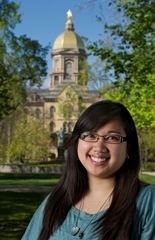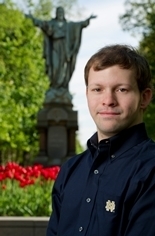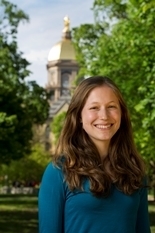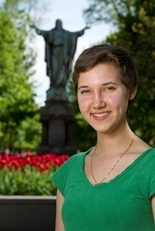Four University of Notre Dame students have received National Science Foundation (NSF) Graduate Research Program (GRFP) Fellowships. The NSF GRFP was created to enhance the scientific and engineering workforce in the United States. The fellowship provides three years of support for the graduate education of students who have demonstrated the potential for significant achievements in science and engineering research. Past NSF Fellows include individuals who have made significant breakthroughs in science and engineering research, as well as some who have been honored as Nobel laureates.
Karen Antonio

Karen Antonio is a graduate student in the Department of Chemistry and Biochemistry. In her research, Antonio investigates molecular interactions and organization within biological cells using optical spectroscopy. She specifically uses Raman scattering, which provides chemical specific information about samples without the need of a dye or stain. The Raman effect is very weak, so to improve the sensitivity of the measurements, nanoparticles are introduced into the cell and bind to a molecule of interest, resulting in enhanced vibrational modes of all of the molecules near the nanoparticle. This technique will be used to study antibody-antigen binding interactions. By comparing the Raman shifts of the antibody in its free and bound states, the chemical interactions pertaining to the antibody recognition can be better understood. The ability to detect, monitor, and analyze behavior at the molecular level may be a powerful tool in addressing current issues in the biomedical field.
Paul Baranay

Senior Paul Baranay will earn a Bachelor of Science with a double major in Biological Sciences and Applied and Computational Mathematics and Statistics this May. Baranay has taken advantage of many research opportunities throughout his undergraduate career. At Notre Dame, he has worked with Steve Buechler, professor of applied and computational mathematics and statistics, on cancer gene network analysis, as well as Frank Collins, the George and Winifred Clark Chair in Biological Science, and Scott Emrich, assistant professor of computer science, on malaria research. Baranay also has worked with Michael Schatz, assistant professor, at Cold Spring Harbor Laboratory in New York to study genome assembly. In addition to his research projects, he currently serves as Co-Editor-in-Chief for Scientia, Notre Dame’s undergraduate journal of scientific research.
Baranay will attend Yale University this fall to earn a Ph.D. in Computational Biology and Bioinformatics, focusing on human disease using large-scale genomics data. This area of study incorporates a variety of different approaches and disciplines, such as data mining (computer science), network models (applied math), and cellular mechanisms (biology and biochemistry). Ultimately, he hopes to integrate computational data with experimental verification to better understand the genetic risk factors underlying disease.
Nancy Paul

Senior Nancy Paul, who is also a member of the Glynn Family Honors Program for the Arts and Sciences, will earn a Bachelor of Science in Physics with a concentration in Advanced Physics in May. As an undergraduate, she has been involved many research projects, both on and off campus, and internationally. Since her freshman year, Paul has worked with Ani Aprahamian, the Frank M. Freimann Professor of Physics, studying experimental nuclear physics. Last summer, she traveled to Grand Accélérateur National d'Ions Lourds (GANIL) in France where she helped develop a new method for predicting separation energies using a functional method and effective boson numbers in the Interacting Boson Model (IBM1). In addition to her research, she currently serves at the Co-Editor-in-Chief for Scientia, Notre Dame’s undergraduate journal of scientific research.
Paul will remain at the University of Notre Dame for her graduate studies. Her area of research will focus on low-energy nuclear structure and its impact on astrophysical processes, such as heavy-element nucleosynthesis. The origin of the heavy elements has been cited by the National Research Council as one of the greatest unanswered questions in physics, and her group will seek to untangle the nuclear physics behind the r-process that is thought to be responsible for approximately 50% of the elements in the universe heavier than iron.
Donna Grace Shrader

Senior Donna Grace Shrader will earn a Bachelor of Science degree in Biological Science in May. She has had extensive research experience over her undergraduate career, working on her own research and serving as a research assistant for professors in the departments of philosophy, biology and chemistry. Her most recent research has focused on the production of peptide antibiotics in Porphyromnas gingivalis in Shaun Lee’s laboratory.
This fall, Shrader will begin the Microbiology Doctoral Training Program at the University of Wisconsin – Madison where she plans to study microbial interactions in polymicrobial communities. This area of study is important medically, especially with cystic fibrosis biofilms and the gut microflora. This research can also help with understanding other understudied systems, such as coral microbiomes and photosynthetic microbial mats.